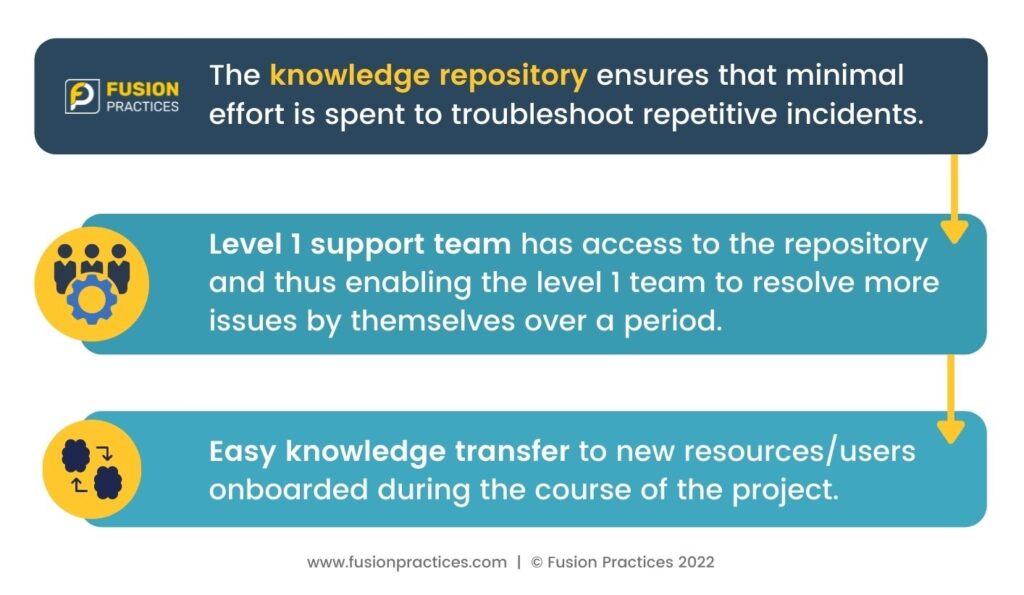For the customers that Fusion Practices provides managed support services, we often see that similar kind of issues may be reported. It is important to find permanent fixes to these issues to bring the ticket count lower. In some other cases, we see situations where the support team members may move into other departments within the organisation or may change their jobs, which means that if a similar kind of issue was to come in the future, we should have standard operational procedures to investigate such issues.
The idea behind the knowledge database for Oracle Cloud ERP is to make sure that we can give quick resolution for the issues that may have been seen in the past. Or in fact avoid such issues all together by giving a permanent fix and updating the knowledge repository with the new feature enhancement. The knowledge repository also gets updated in cases where there is a repetitive issue and a permanent solution cannot be found. Some portion of the knowledge repository can be exposed back to the end-users so that it is educational and the issue is resolved. For some of our customers, we have integrated the knowledge database with their chatbots to help resolution by sharing the link to the knowledge article. This helps reduce the ticket counts to the IT helpdesk. In this article, we talk about our overall approach to knowledge management that we have evolved learning from our experiences in Manage Support Services that we provide for Oracle ERP & EPM cloud customers.
Fusion Practices’ resources have experience from the very first release of Oracle Cloud ERP and our subsidiary company (Apps2Fusion) provides Oracle training as its core business. We have an enormous number of knowledge articles and maintain our own evolving knowledge repository. As part of the Fusion Practices Manage Support program, we bring all the knowledge articles that are relevant to the customer and maintain the same in the customer’s knowledge repository. This would help the customer’s level 1 Helpdesk team to learn and answer basic user queries themselves right from the start of the project.
Our support strategy in Oracle Cloud ERP strongly banks upon maintaining a quality knowledge database. Proactive actions are always taken by Fusion Practices to ensure the quality of the knowledge content. Fusion Practices Managed Services (FPMS) team carries out the following tasks:
- Taking ownership of maintaining the Knowledge database
- Planning and building Document Repository Structure
- Depositing all the relevant knowledge articles from Fusion Practices repository
- Collecting available documents from the customer including service strategy, design etc
- The knowledge database is kept updated for any BAU (Business as Usual) changes
- Documents related to new enhancements are implemented and uploaded to the knowledge library
- Configuration workbook, technical documents of any new module rollouts are collected from the implementation team and uploaded to correct folders/repositories
We bring all the knowledge articles that are relevant to the customer and maintain the same in the customer’s knowledge repository
As part of our Managed Support in Oracle Cloud ERP, we maintain the following documents:
- Maintaining a repository of issues and resolutions, including a detailed process document prepared for repeated issues. Also, identifying the need for training if required.
- Configuration of Workbook updates – With relevant changes and version control
- Requirement and Design Specification (As per Oracle Unified Methodology)
- Repository of all the technical packages/updates during the support process.
Value adds & advantages for the Customer:

Read our blog highlighting the Fusion Practices Support Model, its Structure and how we ensure quality – Click here





